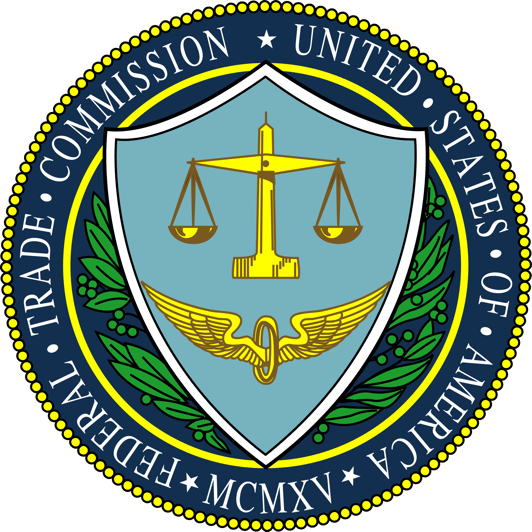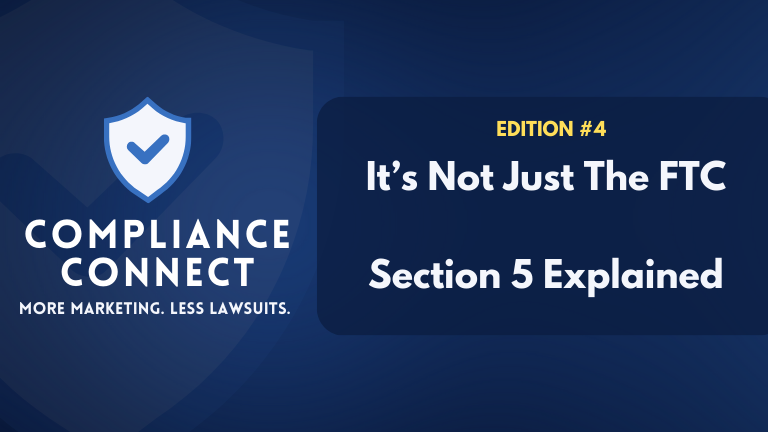Good morning! This is the fourth edition of the Compliance Connect newsletter.
The goal is simple: to keep you in the loop on what the FTC and other regulatory agencies are up to so that you can protect yourself.
These newsletters will land in your inbox twice a week – Mondays and Thursdays.
Remember: this is NOT legal advice, only information!
Here’s the rundown today…
- ⚠️ Here Are The OTHER Agencies You Need To Worry About
- 🚔 FTC Target Ends Up In Jail
- 🤖 Will The FTC Target AI Summaries?
- 🗣️ FTC Chair Lina Khan Reveals Her Priorities
- 📜 Important Compliance Law Explained
Compliance Digest: What You Should Read Today
Target Of FTC Investigation Goes To Jail
The CEO of Simple Health Plans LLC was investigated for a scheme that allegedly caused 400,000 people to buy fake health insurance.
The FTC got a $195 million judgment plus a lifetime ban from selling healthcare products.
But the consequences didn’t stop there. The Department of Justice (DOJ) got involved, and now he’s going to jail for 25 years! Anik and Greg talk more about the case here.
Senate Leaders Want The FTC To Look At AI Summaries
If you do a Google search, you might get an AI summary of multiple articles that answer your question.
A group of Democratic senators believe these summaries prevent content creators from monetizing their work. They want the FTC and DOJ to investigate.
While there isn’t any official action yet, if you are a content creator, this is an important story to follow.
Profile Of FTC Chair Lina Khan
Lina Khan has built her career by challenging the traditional approach to anti trust.
Under her leadership, the FTC has prioritized anti trust and changed the way it enforces it.
This has made her one of the most controversial FTC chairs since the agency was created.
Check out this profile to better understand her vision and how she views the FTC’s role in the economy.

It’s NOT Just The FTC – Here Are The Other Regulators You Need To Pay Attention To
We talk a lot about the FTC because that’s the agency most business owners and marketers are aware of. However, they are NOT the only potential threat to your business.
When it comes to advertising and marketing, several federal and state regulators, along with some non-government organization, are out there watching out for non-compliant marketing.
Here’s a breakdown of the major ones besides the FTC that you need to know about…
#1 – Federal Communications Commission (FCC)
The FCC regulates anything to do with communications—radio, TV, phone, internet—you name it. They’re big on telephone sales and marketing.
The rule you might’ve heard of is the Telephone Consumer Protection Act (TCPA). This law limits when and how you can call or text people unless you have their explicit written permission.
#2 – Food and Drug Administration (FDA)
The FDA is all about ensuring that any marketing claims related to food, drugs, cosmetics, and medical devices aren’t misleading.
If you’re making health claims in your ads, you better be able to back them up. Otherwise, the FDA can step in with warnings, demand product recalls, or slap you with fines.
Health and wellness marketers need to be especially careful here.
#3 – Securities and Exchange Commission (SEC)
This isn’t the college sports conference! This SEC oversees the marketing of financial products and services.
If you’re advertising investments or financial products, you have to be follow guidelines laid out by the SEC.
Misleading potential investors can lead to huge fines, sanctions, or even criminal charges, so make sure you know the rules!
#4 – Consumer Financial Protection Bureau (CFPB)
The CFPB is focused on protecting consumers from shady practices in the financial world, like with loans and credit.
If you’re marketing anything in the financial space, transparency is key. All your ads need to be upfront about terms and conditions. If not, you could face serious fines and legal trouble.
Anik and Greg talk about the CFPB in this episode of the Don’t Say That podcast.
#5 – State Regulatory Bodies
Each state has its own consumer protection agencies, and they’re NOT afraid to enforce local laws against deceptive marketing.
While states usually follow federal guidelines, some states have even stricter rules, especially around telemarketing or subscription services.
Don’t think just because you’re in one state, you only have to follow their rules.
If you sell to people in other states, violations can lead to penalties, legal battles, or even being banned from operating there. States can also team up with federal agencies, which can make things even worse!
#6 – Better Business Bureau (BBB)
The BBB isn’t a government body, but it’s an organization that you need to pay attention to.
The BBB allows customers to file complaints about companies. If those complaints pile up and you don’t address them, it can lead to more attention from regulators like the FTC or state attorneys general.
#7 – American Association of Retired Persons (AARP)
The AARP is focused on protecting older adults. Regulators pay close attention to businesses that market to vulnerable groups, including senior citizens.
Even if you’re not specifically targeting seniors but notice a lot of them buying from you, then you need to be extra careful with your marketing and sales processes.
Did You Know…
In California, you have to allow a client to opt out of consent in the same manner in which they opted in. This means that, if they bought a subscription plan online, they have to be able to cancel it online.

Quick Compliance Tip: Section 5 Simplified
If you want to get compliant, then you need to know what Section 5 of the FTC Act says.
This is one of the CORE laws the FTC uses to regulate businesses.
Section 5 prohibits “Unfair and Deceptive Acts or Practices” and gives the FTC the authority to create rules and go after companies that violate those rules.
But what do “unfair and deceptive acts or practices” actually mean?
Let’s break it down…
An act is considered UNFAIR if it…
- Causes substantial harm to consumers.
- The harm cannot be reasonably avoided.
- The harm outweighs any benefits provided.
An act is DECEPTIVE if…
- A representation or omission is likely to MISLEAD a consumer.
- A consumer’s interpretation is REASONABLE.
- The misrepresentation is material to the decision-making process.
Imagine an ad promoting a Tesla, filled with glowing reviews and visuals, but the actual offer is for a gas-powered car.
This bait-and-switch tactic is clearly deceptive. It’s harmful if the customer spends a bunch of money expecting one thing but getting another.
Similarly, many in the information industry promote unrealistic results, like a stay-at-home mom making $9,500/month on Amazon with no time and effort.
Like the previous example, this is deceptive and harmful!
The core of Section 5 is about aligning the promises made in your marketing with the actual customer experience.
The good news is that transparent and truthful advertising helps you build trust and a sustainable business with satisfied customers.
As a nice bonus, you’ll reduce your odds of getting investigated and sued!
